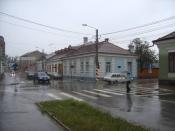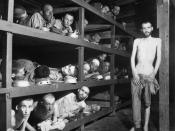During the Holocaust in which millions of Jewish men and women were deemed fit for death by a prejudice. As told in "Night" by Elie Wiesel; Eliezer, a young boy from Sighet was forced to endure one of mankind's most horrendous atrocities. He witnessed the daily suffering and death of humans during his time in the Nazi concentration camps. He had grown apathetic to the withering away of mortal life. However, his reaction to the sad-eyed angel being strung upon the gallows was unique in which the 'angel' was a symbol of his own silent god dying at the merciless hands of Nazi Germany.
The God in Night is described as a silent, un-wavered being, impassively gazing down upon his followers as they suffered and died calling out for his help. Despite his deity being "the Eternal, Lord of the Universe, the All-Powerful and Terrible, [he] was silent." (Page 31) Eliezer and the other Jewish people cry out for Gods aid and mercy.
However, their pleas were left unanswered. The God in night did not save his followers from certain death; he remained muted while they cried out for his help. Despite the fact that he was an omnipotent being capable of anything, he did nothing as those who depended upon him for mercy were answered with silence.
During the time Eliezer spent in the camps he was present for many hangings. In particular was the execution of a young man from Warsaw. As the death sentenced sliced through the air the man "cried in a clam strong voice: 'Long live liberty!'" (Page 59) He spoke out against the Nazis while the God above remained ever watchful, un-wavering and silent. Eliezer was unmoved by the execution, instead he notices that "the soup [was] excellent that evening." (Page 60) Eliezers detachment from the death of another human shows itself in aloof his speech is when he spoke of the soup. The death of the youth meant little to him. Thousands of humans died daily, their deaths were a minor factor in his life at the camps. Death had become an average occurrence.
As the executions continued Eliezer witness one particular hanging which distressed him. A small "sad eyed angel" (page 61) who was sentenced to death as the entire camp watched. The two men whose fates were bound to death as well uttered the same phrase as the deceased Warsaw youth had uttered, however, "The child was silent." (Page 61) The sad-eyed angel is a symbol of the silent God present in Night. They both remained silent in the face of atrocity and suffering. The use of the word angel to describe the boy, suggests a benevolent being of good equating to a symbol of God. The angel was hanged, as Eliezers thoughts ceased to stray far from the thought of his death. The death of his god delved deep within his mind and the mind of those around him, as that night he recalled that the soup "tasted of corpses." (Page 62) The death of his God lingered in his mind, unlike before in which he swept aside the thought of death with ease. He did not find the soup delicious after the execution of the angel; he found that it tasted like death, from the realization that his God had just been hanged.
The death of a god, almost an oxymoron when spoken as one would believe that God the Almighty is an omnipotent being. Impossible to destroy, everlasting, ever watchful and protective of his followers. However, the god described in Night is a silent, un-wavered god as he gazed down from the heavens upon his suffering followers doing and saying nothing, ultimately meeting his end at the hands of Nazi Germany. Eliezer was exposed to an uncaring silent God, the daily executions of Jewish people which numbed his compassion, and eventually the murder of his own deity at the hands of the Nazis. Eliezers troubled thoughts will never stray far from the day they hanged the sad-eyed angel, the symbol of his omnipotent God, hung limp upon a gallows.


